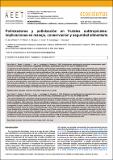Por favor, use este identificador para citar o enlazar a este item:
http://hdl.handle.net/10261/228826COMPARTIR / EXPORTAR:
 SHARE
BASE SHARE
BASE
|
|
| Visualizar otros formatos: MARC | Dublin Core | RDF | ORE | MODS | METS | DIDL | DATACITE | |

| Título: | Pollinators and pollination in subtropical fruit crops: management and implications for conservation and food-security |
Autor: | de la Peña, Eduardo; Lora, Jorge CSIC ORCID ; Larrañaga, Nerea; Hormaza Urroz, José Ignacio CSIC ORCID ; Pérez Méndez, Verónica CSIC ORCID | Palabras clave: | Avocados native fruit crops mango diversity Cherimoya |
Fecha de publicación: | 1-may-2018 | Resumen: | The commercialization and consumption of tropical fruits has grown worldwide during the last decade. This trend is expected to continue, due to the increasing world population and the greater demand for these products in western markets. As in most fruit crops, one of the main bottlenecks in production is pollination, which determines fruit-tree and pollinator management to a large extent. Pollination management is therefore a defining factor in the composition and diversity of agro-systems. Because of this, the intensive production of fruit crops in many areas of the world requires adequate management of crops to enable: (1) an optimal production of fruit crops; (2) the conservation of insect communities. This is particularly important in developing countries, where the centers of genetic diversity of these crops are generally found and pollinator diversity is often poorly known and seriously threatened by agricultural intensification. However, some of these crops have been introduced into geographic areas away from the native areas of origin, which is an agronomic challenge but, at the same time, provides an opportunity to study and test under controlled conditions new management strategies. In this work we present a brief review on pollinators and pollination in subtropical fruit crops focusing on three species of international economic relevance such as mango, avocado and cherimoya. With the knowledge acquired on these species in a Mediterranean context, we propose a road-map to develop appropriate management strategies in other fruit crops and geographical areas. | Versión del editor: | https://www.revistaecosistemas.net/index.php/ecosistemas/article/view/1480 | URI: | http://hdl.handle.net/10261/228826 | ISSN: | 1697-2473 |
| Aparece en las colecciones: | (IHSM) Artículos |
Ficheros en este ítem:
| Fichero | Descripción | Tamaño | Formato | |
|---|---|---|---|---|
| 1480-Texto del artículo-6169-1-10-20180729-1.pdf | Review | 4,31 MB | Adobe PDF |  Visualizar/Abrir |
CORE Recommender
Page view(s)
173
checked on 23-abr-2024
Download(s)
179
checked on 23-abr-2024
Google ScholarTM
Check
NOTA: Los ítems de Digital.CSIC están protegidos por copyright, con todos los derechos reservados, a menos que se indique lo contrario.
